University Dementia Care Report: Introduction, Strategies, and Impact
VerifiedAdded on 2023/01/18
|11
|3145
|90
Report
AI Summary
This report provides a comprehensive overview of dementia care, addressing various aspects of the disease and its management. It begins with an introduction to dementia, highlighting its progressive nature and impact on patients' cognitive and functional abilities, using the case of Mr. B as an example. The report then delves into the crucial roles and responsibilities of carers, emphasizing the importance of person-centered care and communication with healthcare professionals. It explores the impact of dementia on patients, including memory loss, cognitive difficulties, and changes in behavior, as well as the challenges faced by carers and the need for support. The report also examines the early onset of dementia, outlining the subtle signs and symptoms that can often be overlooked, and stresses the importance of early detection. Furthermore, it discusses the implementation of person-centered care strategies and the interaction of multidisciplinary teams in providing holistic care. Finally, the report offers recommendations for improving the quality of care, including early detection, comprehensive assessments, pain management, and the involvement of family members. It concludes by emphasizing the importance of collaborative efforts and vigilance in addressing the changing needs of dementia patients, ultimately promoting their dignity and autonomy.

Dementia Care 1
INTRODUCTION TO DEMENTIA CARE
by (Name)
Course
Tutor
University
City and State of location.
Date
INTRODUCTION TO DEMENTIA CARE
by (Name)
Course
Tutor
University
City and State of location.
Date
Paraphrase This Document
Need a fresh take? Get an instant paraphrase of this document with our AI Paraphraser
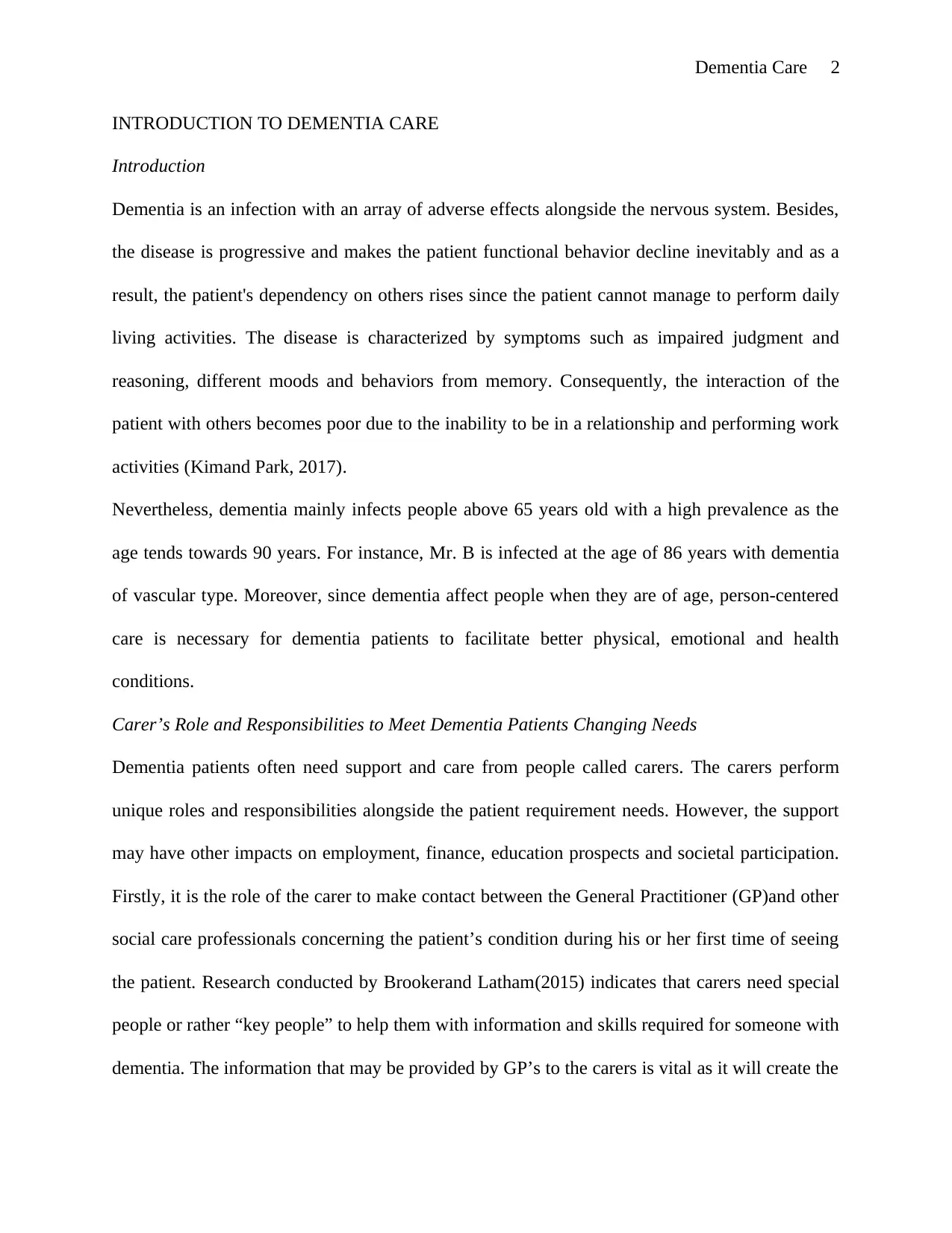
Dementia Care 2
INTRODUCTION TO DEMENTIA CARE
Introduction
Dementia is an infection with an array of adverse effects alongside the nervous system. Besides,
the disease is progressive and makes the patient functional behavior decline inevitably and as a
result, the patient's dependency on others rises since the patient cannot manage to perform daily
living activities. The disease is characterized by symptoms such as impaired judgment and
reasoning, different moods and behaviors from memory. Consequently, the interaction of the
patient with others becomes poor due to the inability to be in a relationship and performing work
activities (Kimand Park, 2017).
Nevertheless, dementia mainly infects people above 65 years old with a high prevalence as the
age tends towards 90 years. For instance, Mr. B is infected at the age of 86 years with dementia
of vascular type. Moreover, since dementia affect people when they are of age, person-centered
care is necessary for dementia patients to facilitate better physical, emotional and health
conditions.
Carer’s Role and Responsibilities to Meet Dementia Patients Changing Needs
Dementia patients often need support and care from people called carers. The carers perform
unique roles and responsibilities alongside the patient requirement needs. However, the support
may have other impacts on employment, finance, education prospects and societal participation.
Firstly, it is the role of the carer to make contact between the General Practitioner (GP)and other
social care professionals concerning the patient’s condition during his or her first time of seeing
the patient. Research conducted by Brookerand Latham(2015) indicates that carers need special
people or rather “key people” to help them with information and skills required for someone with
dementia. The information that may be provided by GP’s to the carers is vital as it will create the
INTRODUCTION TO DEMENTIA CARE
Introduction
Dementia is an infection with an array of adverse effects alongside the nervous system. Besides,
the disease is progressive and makes the patient functional behavior decline inevitably and as a
result, the patient's dependency on others rises since the patient cannot manage to perform daily
living activities. The disease is characterized by symptoms such as impaired judgment and
reasoning, different moods and behaviors from memory. Consequently, the interaction of the
patient with others becomes poor due to the inability to be in a relationship and performing work
activities (Kimand Park, 2017).
Nevertheless, dementia mainly infects people above 65 years old with a high prevalence as the
age tends towards 90 years. For instance, Mr. B is infected at the age of 86 years with dementia
of vascular type. Moreover, since dementia affect people when they are of age, person-centered
care is necessary for dementia patients to facilitate better physical, emotional and health
conditions.
Carer’s Role and Responsibilities to Meet Dementia Patients Changing Needs
Dementia patients often need support and care from people called carers. The carers perform
unique roles and responsibilities alongside the patient requirement needs. However, the support
may have other impacts on employment, finance, education prospects and societal participation.
Firstly, it is the role of the carer to make contact between the General Practitioner (GP)and other
social care professionals concerning the patient’s condition during his or her first time of seeing
the patient. Research conducted by Brookerand Latham(2015) indicates that carers need special
people or rather “key people” to help them with information and skills required for someone with
dementia. The information that may be provided by GP’s to the carers is vital as it will create the
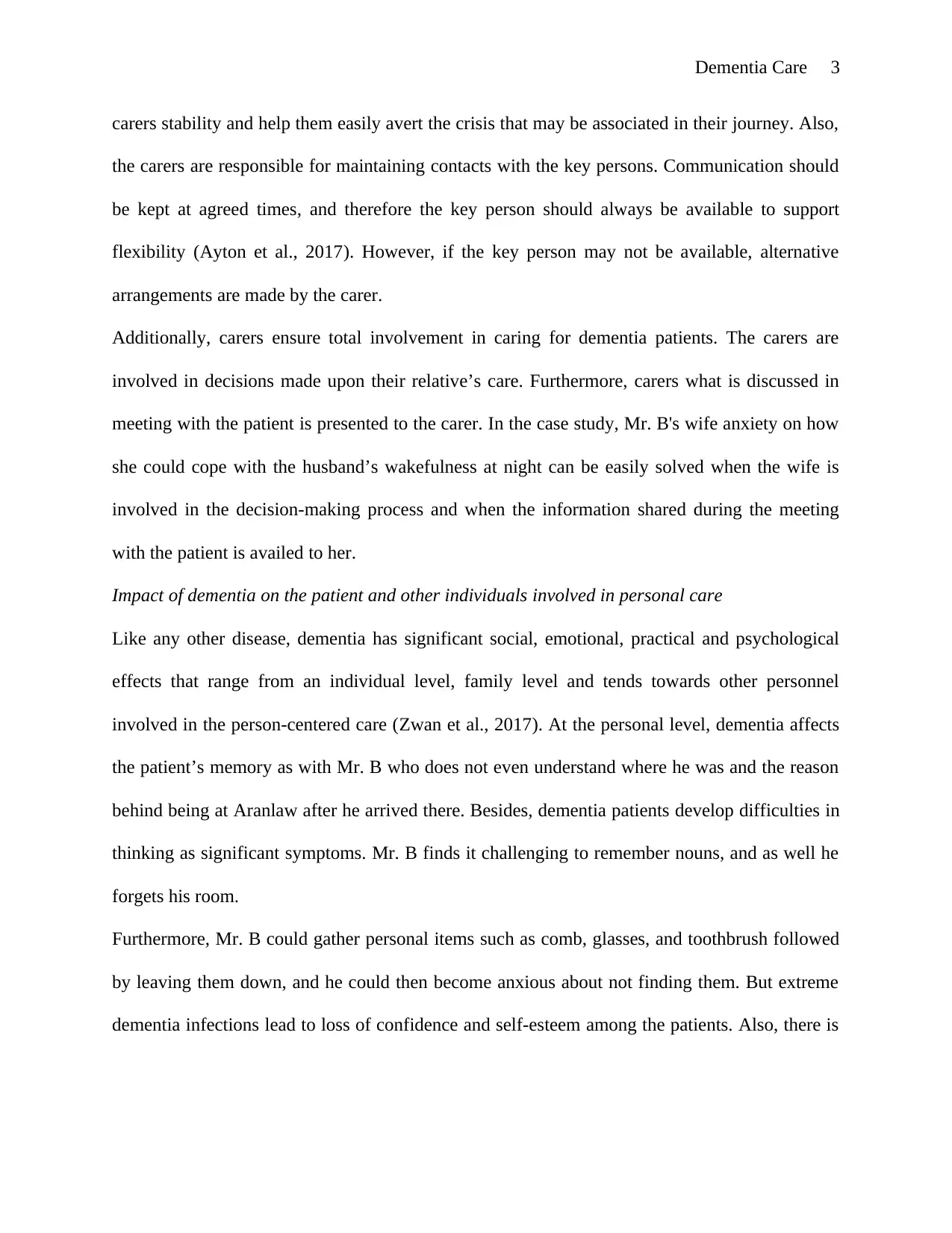
Dementia Care 3
carers stability and help them easily avert the crisis that may be associated in their journey. Also,
the carers are responsible for maintaining contacts with the key persons. Communication should
be kept at agreed times, and therefore the key person should always be available to support
flexibility (Ayton et al., 2017). However, if the key person may not be available, alternative
arrangements are made by the carer.
Additionally, carers ensure total involvement in caring for dementia patients. The carers are
involved in decisions made upon their relative’s care. Furthermore, carers what is discussed in
meeting with the patient is presented to the carer. In the case study, Mr. B's wife anxiety on how
she could cope with the husband’s wakefulness at night can be easily solved when the wife is
involved in the decision-making process and when the information shared during the meeting
with the patient is availed to her.
Impact of dementia on the patient and other individuals involved in personal care
Like any other disease, dementia has significant social, emotional, practical and psychological
effects that range from an individual level, family level and tends towards other personnel
involved in the person-centered care (Zwan et al., 2017). At the personal level, dementia affects
the patient’s memory as with Mr. B who does not even understand where he was and the reason
behind being at Aranlaw after he arrived there. Besides, dementia patients develop difficulties in
thinking as significant symptoms. Mr. B finds it challenging to remember nouns, and as well he
forgets his room.
Furthermore, Mr. B could gather personal items such as comb, glasses, and toothbrush followed
by leaving them down, and he could then become anxious about not finding them. But extreme
dementia infections lead to loss of confidence and self-esteem among the patients. Also, there is
carers stability and help them easily avert the crisis that may be associated in their journey. Also,
the carers are responsible for maintaining contacts with the key persons. Communication should
be kept at agreed times, and therefore the key person should always be available to support
flexibility (Ayton et al., 2017). However, if the key person may not be available, alternative
arrangements are made by the carer.
Additionally, carers ensure total involvement in caring for dementia patients. The carers are
involved in decisions made upon their relative’s care. Furthermore, carers what is discussed in
meeting with the patient is presented to the carer. In the case study, Mr. B's wife anxiety on how
she could cope with the husband’s wakefulness at night can be easily solved when the wife is
involved in the decision-making process and when the information shared during the meeting
with the patient is availed to her.
Impact of dementia on the patient and other individuals involved in personal care
Like any other disease, dementia has significant social, emotional, practical and psychological
effects that range from an individual level, family level and tends towards other personnel
involved in the person-centered care (Zwan et al., 2017). At the personal level, dementia affects
the patient’s memory as with Mr. B who does not even understand where he was and the reason
behind being at Aranlaw after he arrived there. Besides, dementia patients develop difficulties in
thinking as significant symptoms. Mr. B finds it challenging to remember nouns, and as well he
forgets his room.
Furthermore, Mr. B could gather personal items such as comb, glasses, and toothbrush followed
by leaving them down, and he could then become anxious about not finding them. But extreme
dementia infections lead to loss of confidence and self-esteem among the patients. Also, there is
⊘ This is a preview!⊘
Do you want full access?
Subscribe today to unlock all pages.

Trusted by 1+ million students worldwide
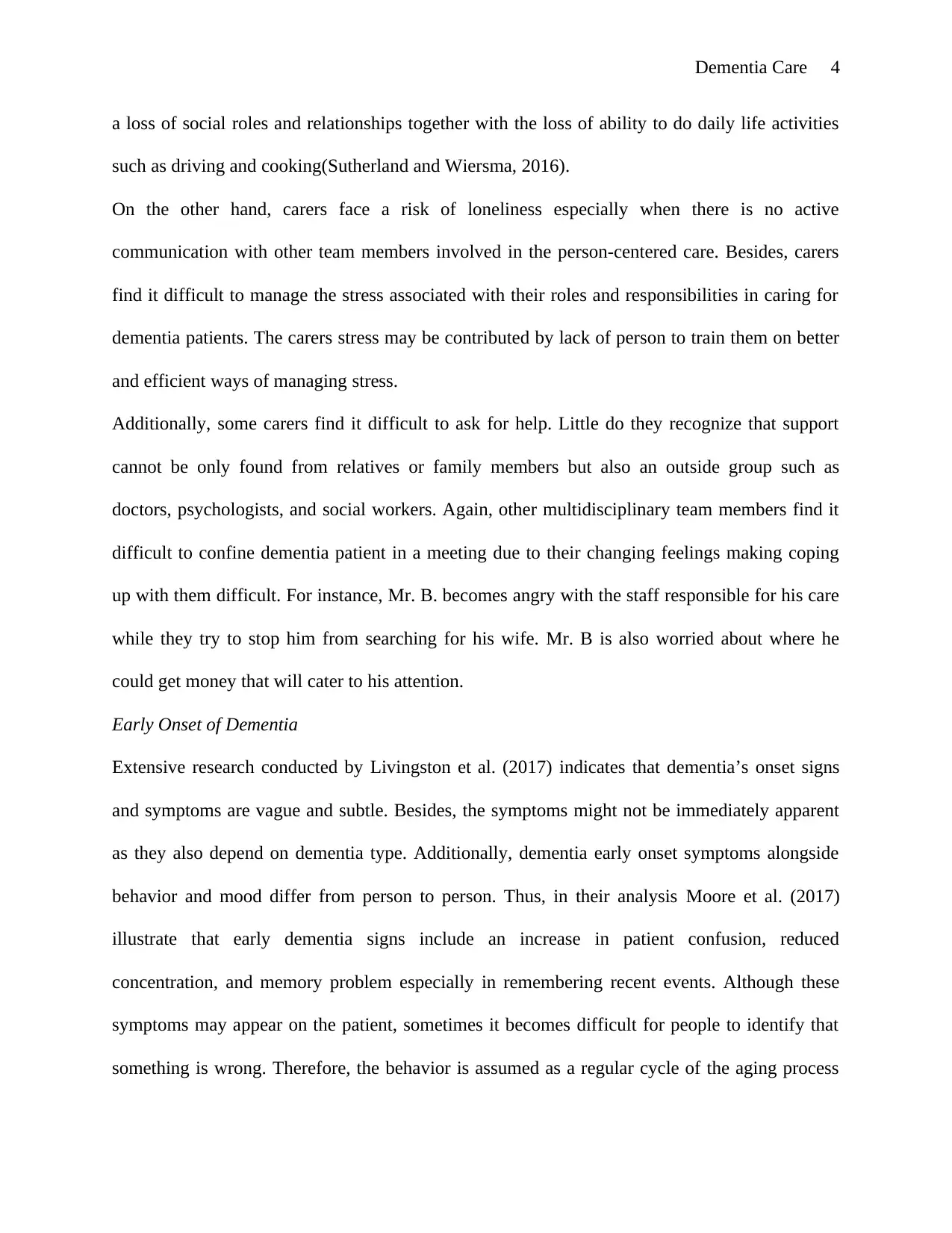
Dementia Care 4
a loss of social roles and relationships together with the loss of ability to do daily life activities
such as driving and cooking(Sutherland and Wiersma, 2016).
On the other hand, carers face a risk of loneliness especially when there is no active
communication with other team members involved in the person-centered care. Besides, carers
find it difficult to manage the stress associated with their roles and responsibilities in caring for
dementia patients. The carers stress may be contributed by lack of person to train them on better
and efficient ways of managing stress.
Additionally, some carers find it difficult to ask for help. Little do they recognize that support
cannot be only found from relatives or family members but also an outside group such as
doctors, psychologists, and social workers. Again, other multidisciplinary team members find it
difficult to confine dementia patient in a meeting due to their changing feelings making coping
up with them difficult. For instance, Mr. B. becomes angry with the staff responsible for his care
while they try to stop him from searching for his wife. Mr. B is also worried about where he
could get money that will cater to his attention.
Early Onset of Dementia
Extensive research conducted by Livingston et al. (2017) indicates that dementia’s onset signs
and symptoms are vague and subtle. Besides, the symptoms might not be immediately apparent
as they also depend on dementia type. Additionally, dementia early onset symptoms alongside
behavior and mood differ from person to person. Thus, in their analysis Moore et al. (2017)
illustrate that early dementia signs include an increase in patient confusion, reduced
concentration, and memory problem especially in remembering recent events. Although these
symptoms may appear on the patient, sometimes it becomes difficult for people to identify that
something is wrong. Therefore, the behavior is assumed as a regular cycle of the aging process
a loss of social roles and relationships together with the loss of ability to do daily life activities
such as driving and cooking(Sutherland and Wiersma, 2016).
On the other hand, carers face a risk of loneliness especially when there is no active
communication with other team members involved in the person-centered care. Besides, carers
find it difficult to manage the stress associated with their roles and responsibilities in caring for
dementia patients. The carers stress may be contributed by lack of person to train them on better
and efficient ways of managing stress.
Additionally, some carers find it difficult to ask for help. Little do they recognize that support
cannot be only found from relatives or family members but also an outside group such as
doctors, psychologists, and social workers. Again, other multidisciplinary team members find it
difficult to confine dementia patient in a meeting due to their changing feelings making coping
up with them difficult. For instance, Mr. B. becomes angry with the staff responsible for his care
while they try to stop him from searching for his wife. Mr. B is also worried about where he
could get money that will cater to his attention.
Early Onset of Dementia
Extensive research conducted by Livingston et al. (2017) indicates that dementia’s onset signs
and symptoms are vague and subtle. Besides, the symptoms might not be immediately apparent
as they also depend on dementia type. Additionally, dementia early onset symptoms alongside
behavior and mood differ from person to person. Thus, in their analysis Moore et al. (2017)
illustrate that early dementia signs include an increase in patient confusion, reduced
concentration, and memory problem especially in remembering recent events. Although these
symptoms may appear on the patient, sometimes it becomes difficult for people to identify that
something is wrong. Therefore, the behavior is assumed as a regular cycle of the aging process
Paraphrase This Document
Need a fresh take? Get an instant paraphrase of this document with our AI Paraphraser
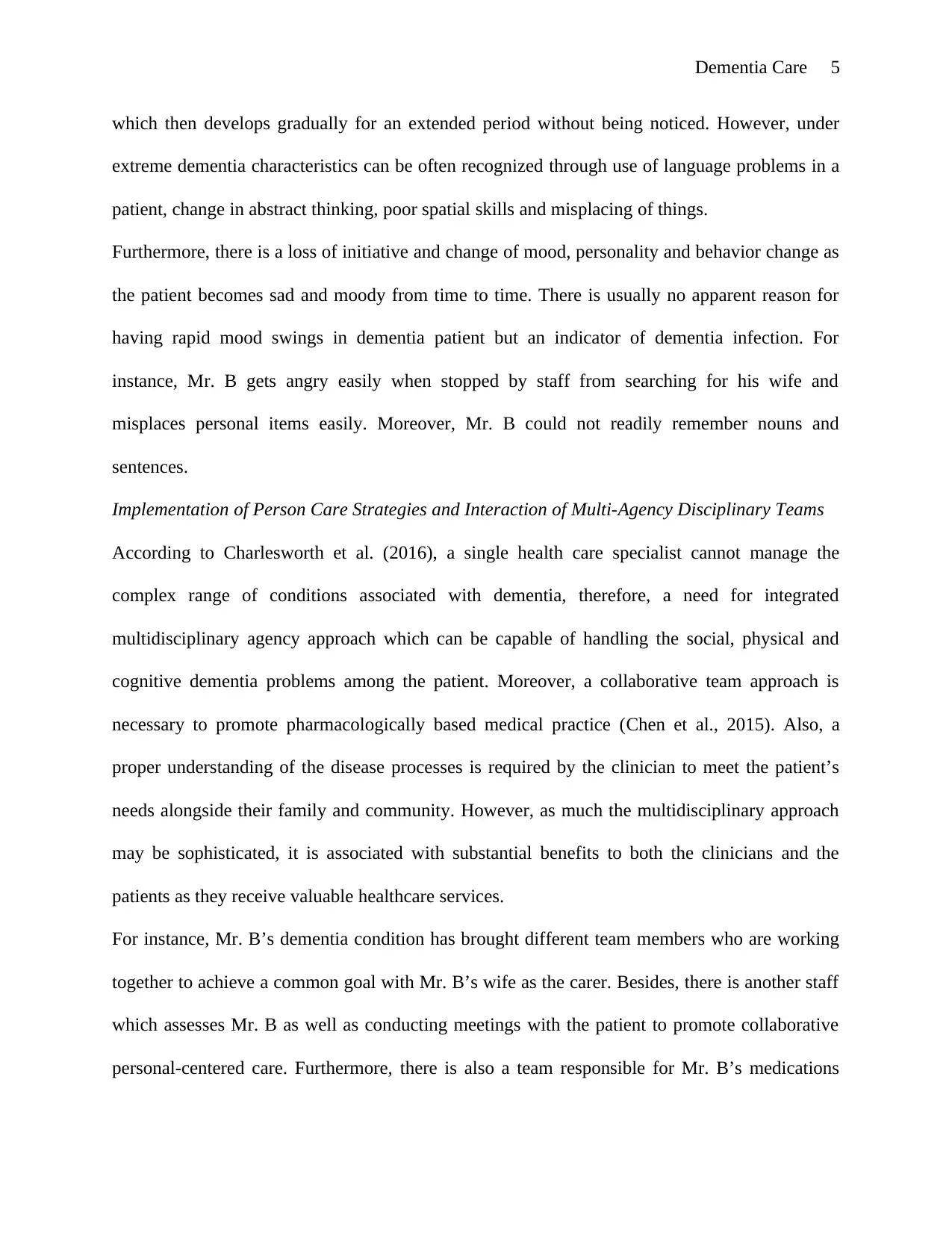
Dementia Care 5
which then develops gradually for an extended period without being noticed. However, under
extreme dementia characteristics can be often recognized through use of language problems in a
patient, change in abstract thinking, poor spatial skills and misplacing of things.
Furthermore, there is a loss of initiative and change of mood, personality and behavior change as
the patient becomes sad and moody from time to time. There is usually no apparent reason for
having rapid mood swings in dementia patient but an indicator of dementia infection. For
instance, Mr. B gets angry easily when stopped by staff from searching for his wife and
misplaces personal items easily. Moreover, Mr. B could not readily remember nouns and
sentences.
Implementation of Person Care Strategies and Interaction of Multi-Agency Disciplinary Teams
According to Charlesworth et al. (2016), a single health care specialist cannot manage the
complex range of conditions associated with dementia, therefore, a need for integrated
multidisciplinary agency approach which can be capable of handling the social, physical and
cognitive dementia problems among the patient. Moreover, a collaborative team approach is
necessary to promote pharmacologically based medical practice (Chen et al., 2015). Also, a
proper understanding of the disease processes is required by the clinician to meet the patient’s
needs alongside their family and community. However, as much the multidisciplinary approach
may be sophisticated, it is associated with substantial benefits to both the clinicians and the
patients as they receive valuable healthcare services.
For instance, Mr. B’s dementia condition has brought different team members who are working
together to achieve a common goal with Mr. B’s wife as the carer. Besides, there is another staff
which assesses Mr. B as well as conducting meetings with the patient to promote collaborative
personal-centered care. Furthermore, there is also a team responsible for Mr. B’s medications
which then develops gradually for an extended period without being noticed. However, under
extreme dementia characteristics can be often recognized through use of language problems in a
patient, change in abstract thinking, poor spatial skills and misplacing of things.
Furthermore, there is a loss of initiative and change of mood, personality and behavior change as
the patient becomes sad and moody from time to time. There is usually no apparent reason for
having rapid mood swings in dementia patient but an indicator of dementia infection. For
instance, Mr. B gets angry easily when stopped by staff from searching for his wife and
misplaces personal items easily. Moreover, Mr. B could not readily remember nouns and
sentences.
Implementation of Person Care Strategies and Interaction of Multi-Agency Disciplinary Teams
According to Charlesworth et al. (2016), a single health care specialist cannot manage the
complex range of conditions associated with dementia, therefore, a need for integrated
multidisciplinary agency approach which can be capable of handling the social, physical and
cognitive dementia problems among the patient. Moreover, a collaborative team approach is
necessary to promote pharmacologically based medical practice (Chen et al., 2015). Also, a
proper understanding of the disease processes is required by the clinician to meet the patient’s
needs alongside their family and community. However, as much the multidisciplinary approach
may be sophisticated, it is associated with substantial benefits to both the clinicians and the
patients as they receive valuable healthcare services.
For instance, Mr. B’s dementia condition has brought different team members who are working
together to achieve a common goal with Mr. B’s wife as the carer. Besides, there is another staff
which assesses Mr. B as well as conducting meetings with the patient to promote collaborative
personal-centered care. Furthermore, there is also a team responsible for Mr. B’s medications
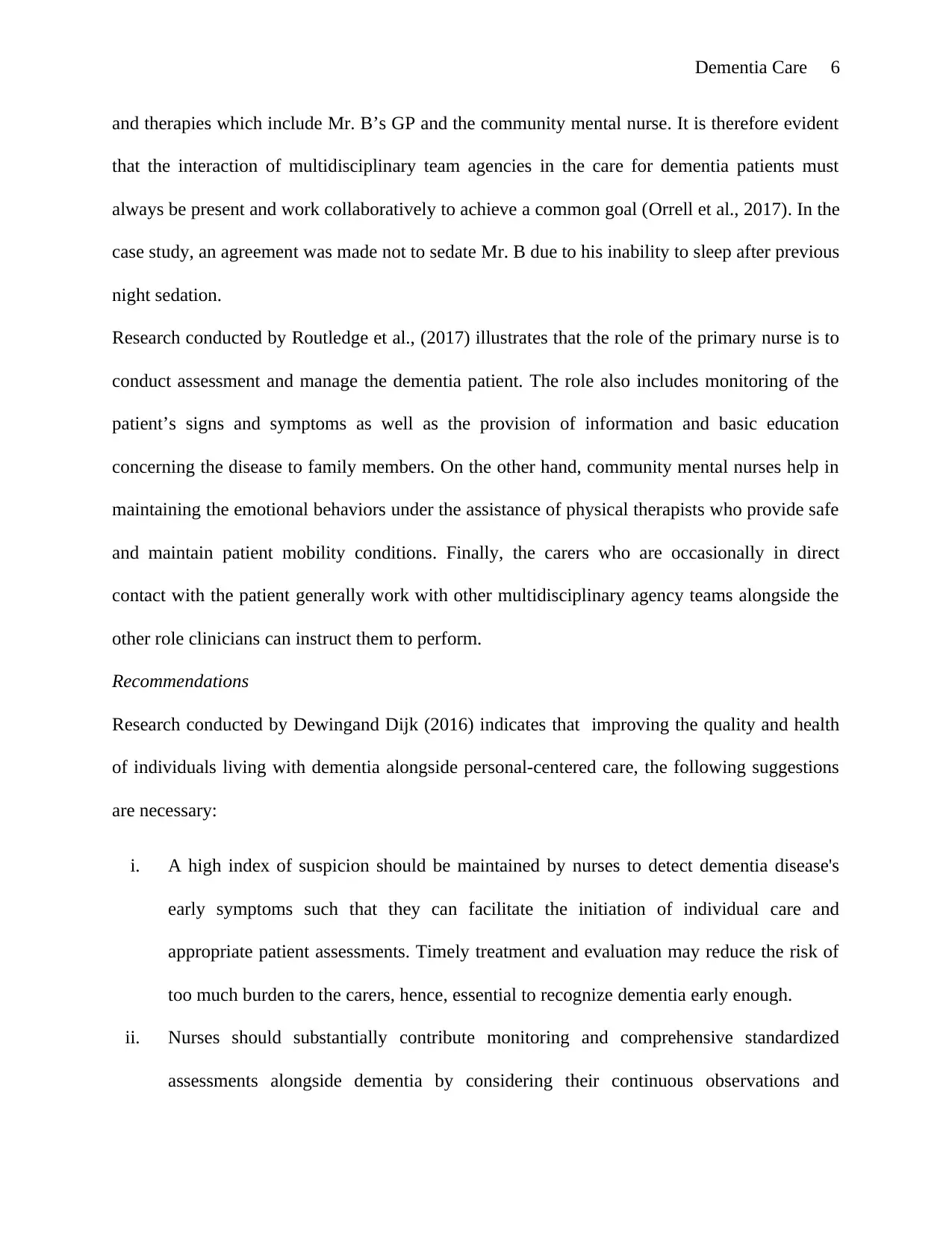
Dementia Care 6
and therapies which include Mr. B’s GP and the community mental nurse. It is therefore evident
that the interaction of multidisciplinary team agencies in the care for dementia patients must
always be present and work collaboratively to achieve a common goal (Orrell et al., 2017). In the
case study, an agreement was made not to sedate Mr. B due to his inability to sleep after previous
night sedation.
Research conducted by Routledge et al., (2017) illustrates that the role of the primary nurse is to
conduct assessment and manage the dementia patient. The role also includes monitoring of the
patient’s signs and symptoms as well as the provision of information and basic education
concerning the disease to family members. On the other hand, community mental nurses help in
maintaining the emotional behaviors under the assistance of physical therapists who provide safe
and maintain patient mobility conditions. Finally, the carers who are occasionally in direct
contact with the patient generally work with other multidisciplinary agency teams alongside the
other role clinicians can instruct them to perform.
Recommendations
Research conducted by Dewingand Dijk (2016) indicates that improving the quality and health
of individuals living with dementia alongside personal-centered care, the following suggestions
are necessary:
i. A high index of suspicion should be maintained by nurses to detect dementia disease's
early symptoms such that they can facilitate the initiation of individual care and
appropriate patient assessments. Timely treatment and evaluation may reduce the risk of
too much burden to the carers, hence, essential to recognize dementia early enough.
ii. Nurses should substantially contribute monitoring and comprehensive standardized
assessments alongside dementia by considering their continuous observations and
and therapies which include Mr. B’s GP and the community mental nurse. It is therefore evident
that the interaction of multidisciplinary team agencies in the care for dementia patients must
always be present and work collaboratively to achieve a common goal (Orrell et al., 2017). In the
case study, an agreement was made not to sedate Mr. B due to his inability to sleep after previous
night sedation.
Research conducted by Routledge et al., (2017) illustrates that the role of the primary nurse is to
conduct assessment and manage the dementia patient. The role also includes monitoring of the
patient’s signs and symptoms as well as the provision of information and basic education
concerning the disease to family members. On the other hand, community mental nurses help in
maintaining the emotional behaviors under the assistance of physical therapists who provide safe
and maintain patient mobility conditions. Finally, the carers who are occasionally in direct
contact with the patient generally work with other multidisciplinary agency teams alongside the
other role clinicians can instruct them to perform.
Recommendations
Research conducted by Dewingand Dijk (2016) indicates that improving the quality and health
of individuals living with dementia alongside personal-centered care, the following suggestions
are necessary:
i. A high index of suspicion should be maintained by nurses to detect dementia disease's
early symptoms such that they can facilitate the initiation of individual care and
appropriate patient assessments. Timely treatment and evaluation may reduce the risk of
too much burden to the carers, hence, essential to recognize dementia early enough.
ii. Nurses should substantially contribute monitoring and comprehensive standardized
assessments alongside dementia by considering their continuous observations and
⊘ This is a preview!⊘
Do you want full access?
Subscribe today to unlock all pages.

Trusted by 1+ million students worldwide
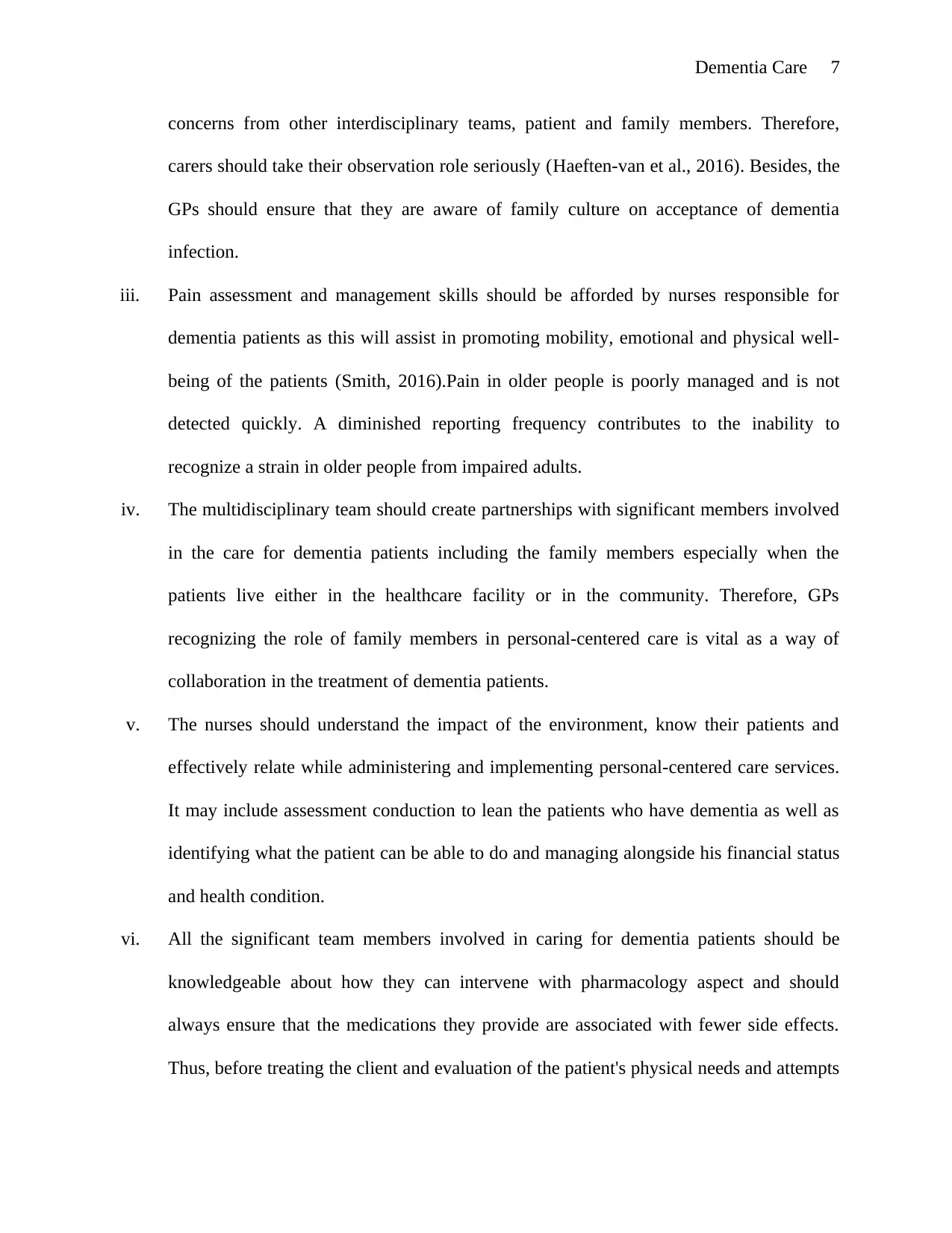
Dementia Care 7
concerns from other interdisciplinary teams, patient and family members. Therefore,
carers should take their observation role seriously (Haeften-van et al., 2016). Besides, the
GPs should ensure that they are aware of family culture on acceptance of dementia
infection.
iii. Pain assessment and management skills should be afforded by nurses responsible for
dementia patients as this will assist in promoting mobility, emotional and physical well-
being of the patients (Smith, 2016).Pain in older people is poorly managed and is not
detected quickly. A diminished reporting frequency contributes to the inability to
recognize a strain in older people from impaired adults.
iv. The multidisciplinary team should create partnerships with significant members involved
in the care for dementia patients including the family members especially when the
patients live either in the healthcare facility or in the community. Therefore, GPs
recognizing the role of family members in personal-centered care is vital as a way of
collaboration in the treatment of dementia patients.
v. The nurses should understand the impact of the environment, know their patients and
effectively relate while administering and implementing personal-centered care services.
It may include assessment conduction to lean the patients who have dementia as well as
identifying what the patient can be able to do and managing alongside his financial status
and health condition.
vi. All the significant team members involved in caring for dementia patients should be
knowledgeable about how they can intervene with pharmacology aspect and should
always ensure that the medications they provide are associated with fewer side effects.
Thus, before treating the client and evaluation of the patient's physical needs and attempts
concerns from other interdisciplinary teams, patient and family members. Therefore,
carers should take their observation role seriously (Haeften-van et al., 2016). Besides, the
GPs should ensure that they are aware of family culture on acceptance of dementia
infection.
iii. Pain assessment and management skills should be afforded by nurses responsible for
dementia patients as this will assist in promoting mobility, emotional and physical well-
being of the patients (Smith, 2016).Pain in older people is poorly managed and is not
detected quickly. A diminished reporting frequency contributes to the inability to
recognize a strain in older people from impaired adults.
iv. The multidisciplinary team should create partnerships with significant members involved
in the care for dementia patients including the family members especially when the
patients live either in the healthcare facility or in the community. Therefore, GPs
recognizing the role of family members in personal-centered care is vital as a way of
collaboration in the treatment of dementia patients.
v. The nurses should understand the impact of the environment, know their patients and
effectively relate while administering and implementing personal-centered care services.
It may include assessment conduction to lean the patients who have dementia as well as
identifying what the patient can be able to do and managing alongside his financial status
and health condition.
vi. All the significant team members involved in caring for dementia patients should be
knowledgeable about how they can intervene with pharmacology aspect and should
always ensure that the medications they provide are associated with fewer side effects.
Thus, before treating the client and evaluation of the patient's physical needs and attempts
Paraphrase This Document
Need a fresh take? Get an instant paraphrase of this document with our AI Paraphraser
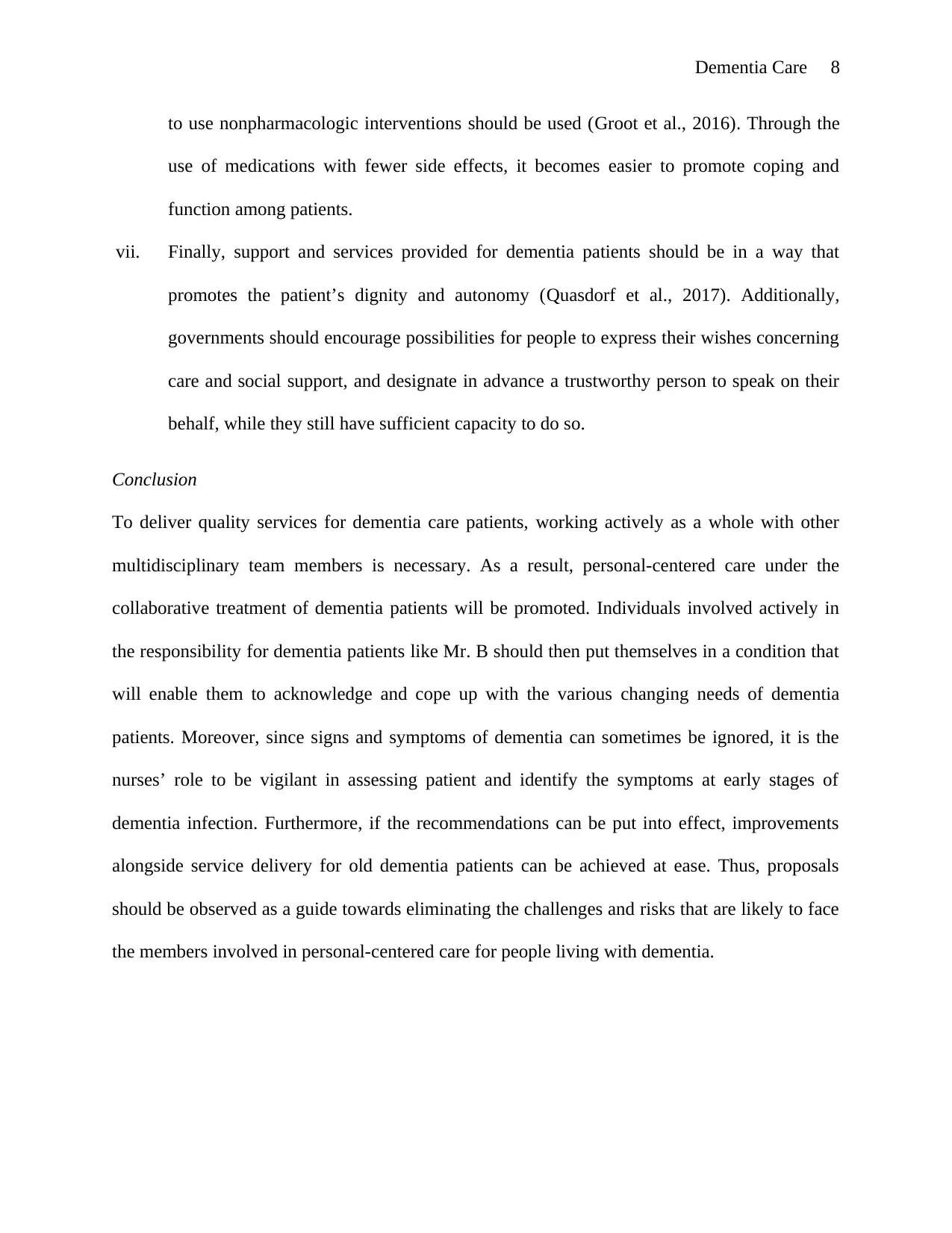
Dementia Care 8
to use nonpharmacologic interventions should be used (Groot et al., 2016). Through the
use of medications with fewer side effects, it becomes easier to promote coping and
function among patients.
vii. Finally, support and services provided for dementia patients should be in a way that
promotes the patient’s dignity and autonomy (Quasdorf et al., 2017). Additionally,
governments should encourage possibilities for people to express their wishes concerning
care and social support, and designate in advance a trustworthy person to speak on their
behalf, while they still have sufficient capacity to do so.
Conclusion
To deliver quality services for dementia care patients, working actively as a whole with other
multidisciplinary team members is necessary. As a result, personal-centered care under the
collaborative treatment of dementia patients will be promoted. Individuals involved actively in
the responsibility for dementia patients like Mr. B should then put themselves in a condition that
will enable them to acknowledge and cope up with the various changing needs of dementia
patients. Moreover, since signs and symptoms of dementia can sometimes be ignored, it is the
nurses’ role to be vigilant in assessing patient and identify the symptoms at early stages of
dementia infection. Furthermore, if the recommendations can be put into effect, improvements
alongside service delivery for old dementia patients can be achieved at ease. Thus, proposals
should be observed as a guide towards eliminating the challenges and risks that are likely to face
the members involved in personal-centered care for people living with dementia.
to use nonpharmacologic interventions should be used (Groot et al., 2016). Through the
use of medications with fewer side effects, it becomes easier to promote coping and
function among patients.
vii. Finally, support and services provided for dementia patients should be in a way that
promotes the patient’s dignity and autonomy (Quasdorf et al., 2017). Additionally,
governments should encourage possibilities for people to express their wishes concerning
care and social support, and designate in advance a trustworthy person to speak on their
behalf, while they still have sufficient capacity to do so.
Conclusion
To deliver quality services for dementia care patients, working actively as a whole with other
multidisciplinary team members is necessary. As a result, personal-centered care under the
collaborative treatment of dementia patients will be promoted. Individuals involved actively in
the responsibility for dementia patients like Mr. B should then put themselves in a condition that
will enable them to acknowledge and cope up with the various changing needs of dementia
patients. Moreover, since signs and symptoms of dementia can sometimes be ignored, it is the
nurses’ role to be vigilant in assessing patient and identify the symptoms at early stages of
dementia infection. Furthermore, if the recommendations can be put into effect, improvements
alongside service delivery for old dementia patients can be achieved at ease. Thus, proposals
should be observed as a guide towards eliminating the challenges and risks that are likely to face
the members involved in personal-centered care for people living with dementia.
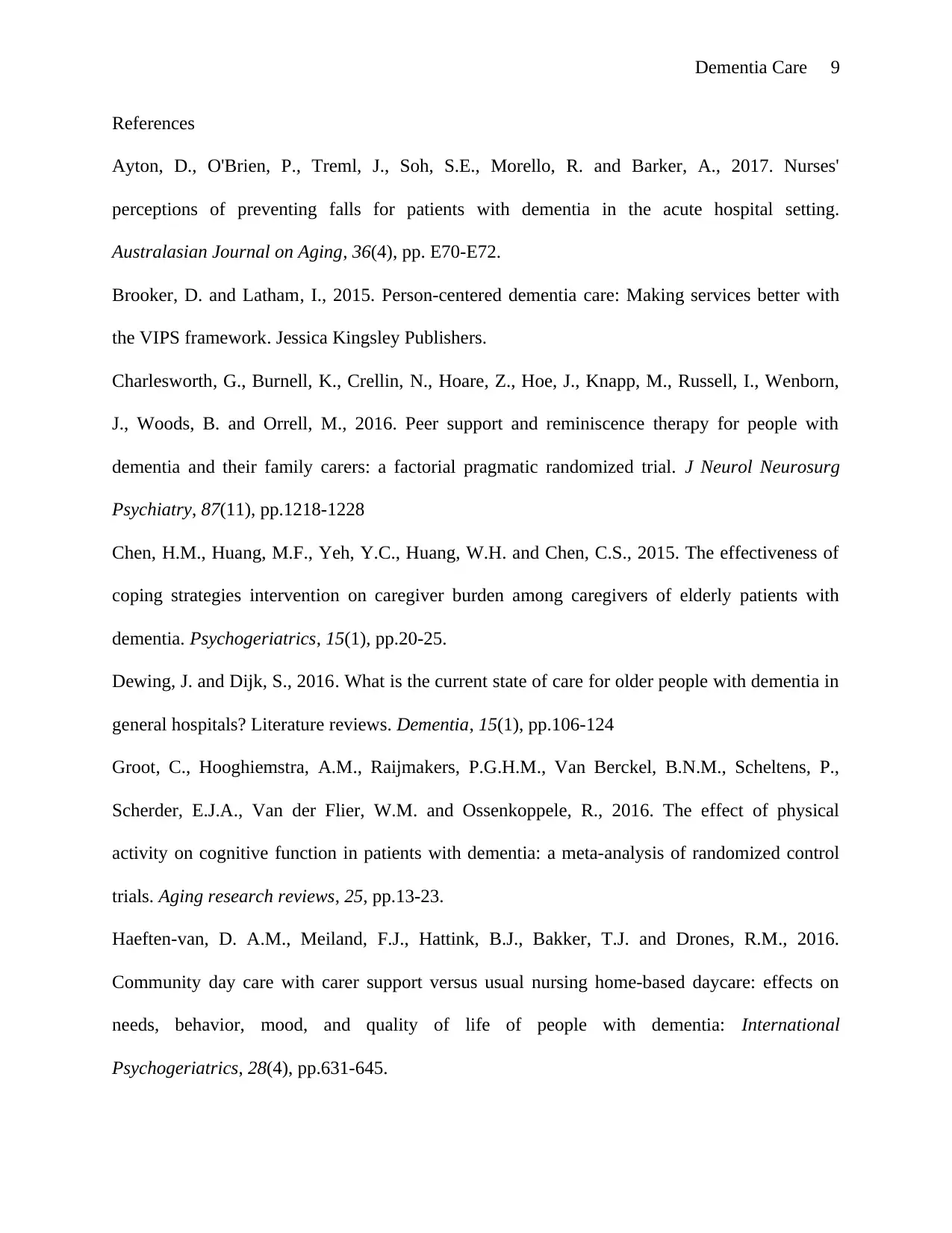
Dementia Care 9
References
Ayton, D., O'Brien, P., Treml, J., Soh, S.E., Morello, R. and Barker, A., 2017. Nurses'
perceptions of preventing falls for patients with dementia in the acute hospital setting.
Australasian Journal on Aging, 36(4), pp. E70-E72.
Brooker, D. and Latham, I., 2015. Person-centered dementia care: Making services better with
the VIPS framework. Jessica Kingsley Publishers.
Charlesworth, G., Burnell, K., Crellin, N., Hoare, Z., Hoe, J., Knapp, M., Russell, I., Wenborn,
J., Woods, B. and Orrell, M., 2016. Peer support and reminiscence therapy for people with
dementia and their family carers: a factorial pragmatic randomized trial. J Neurol Neurosurg
Psychiatry, 87(11), pp.1218-1228
Chen, H.M., Huang, M.F., Yeh, Y.C., Huang, W.H. and Chen, C.S., 2015. The effectiveness of
coping strategies intervention on caregiver burden among caregivers of elderly patients with
dementia. Psychogeriatrics, 15(1), pp.20-25.
Dewing, J. and Dijk, S., 2016. What is the current state of care for older people with dementia in
general hospitals? Literature reviews. Dementia, 15(1), pp.106-124
Groot, C., Hooghiemstra, A.M., Raijmakers, P.G.H.M., Van Berckel, B.N.M., Scheltens, P.,
Scherder, E.J.A., Van der Flier, W.M. and Ossenkoppele, R., 2016. The effect of physical
activity on cognitive function in patients with dementia: a meta-analysis of randomized control
trials. Aging research reviews, 25, pp.13-23.
Haeften-van, D. A.M., Meiland, F.J., Hattink, B.J., Bakker, T.J. and Drones, R.M., 2016.
Community day care with carer support versus usual nursing home-based daycare: effects on
needs, behavior, mood, and quality of life of people with dementia: International
Psychogeriatrics, 28(4), pp.631-645.
References
Ayton, D., O'Brien, P., Treml, J., Soh, S.E., Morello, R. and Barker, A., 2017. Nurses'
perceptions of preventing falls for patients with dementia in the acute hospital setting.
Australasian Journal on Aging, 36(4), pp. E70-E72.
Brooker, D. and Latham, I., 2015. Person-centered dementia care: Making services better with
the VIPS framework. Jessica Kingsley Publishers.
Charlesworth, G., Burnell, K., Crellin, N., Hoare, Z., Hoe, J., Knapp, M., Russell, I., Wenborn,
J., Woods, B. and Orrell, M., 2016. Peer support and reminiscence therapy for people with
dementia and their family carers: a factorial pragmatic randomized trial. J Neurol Neurosurg
Psychiatry, 87(11), pp.1218-1228
Chen, H.M., Huang, M.F., Yeh, Y.C., Huang, W.H. and Chen, C.S., 2015. The effectiveness of
coping strategies intervention on caregiver burden among caregivers of elderly patients with
dementia. Psychogeriatrics, 15(1), pp.20-25.
Dewing, J. and Dijk, S., 2016. What is the current state of care for older people with dementia in
general hospitals? Literature reviews. Dementia, 15(1), pp.106-124
Groot, C., Hooghiemstra, A.M., Raijmakers, P.G.H.M., Van Berckel, B.N.M., Scheltens, P.,
Scherder, E.J.A., Van der Flier, W.M. and Ossenkoppele, R., 2016. The effect of physical
activity on cognitive function in patients with dementia: a meta-analysis of randomized control
trials. Aging research reviews, 25, pp.13-23.
Haeften-van, D. A.M., Meiland, F.J., Hattink, B.J., Bakker, T.J. and Drones, R.M., 2016.
Community day care with carer support versus usual nursing home-based daycare: effects on
needs, behavior, mood, and quality of life of people with dementia: International
Psychogeriatrics, 28(4), pp.631-645.
⊘ This is a preview!⊘
Do you want full access?
Subscribe today to unlock all pages.

Trusted by 1+ million students worldwide
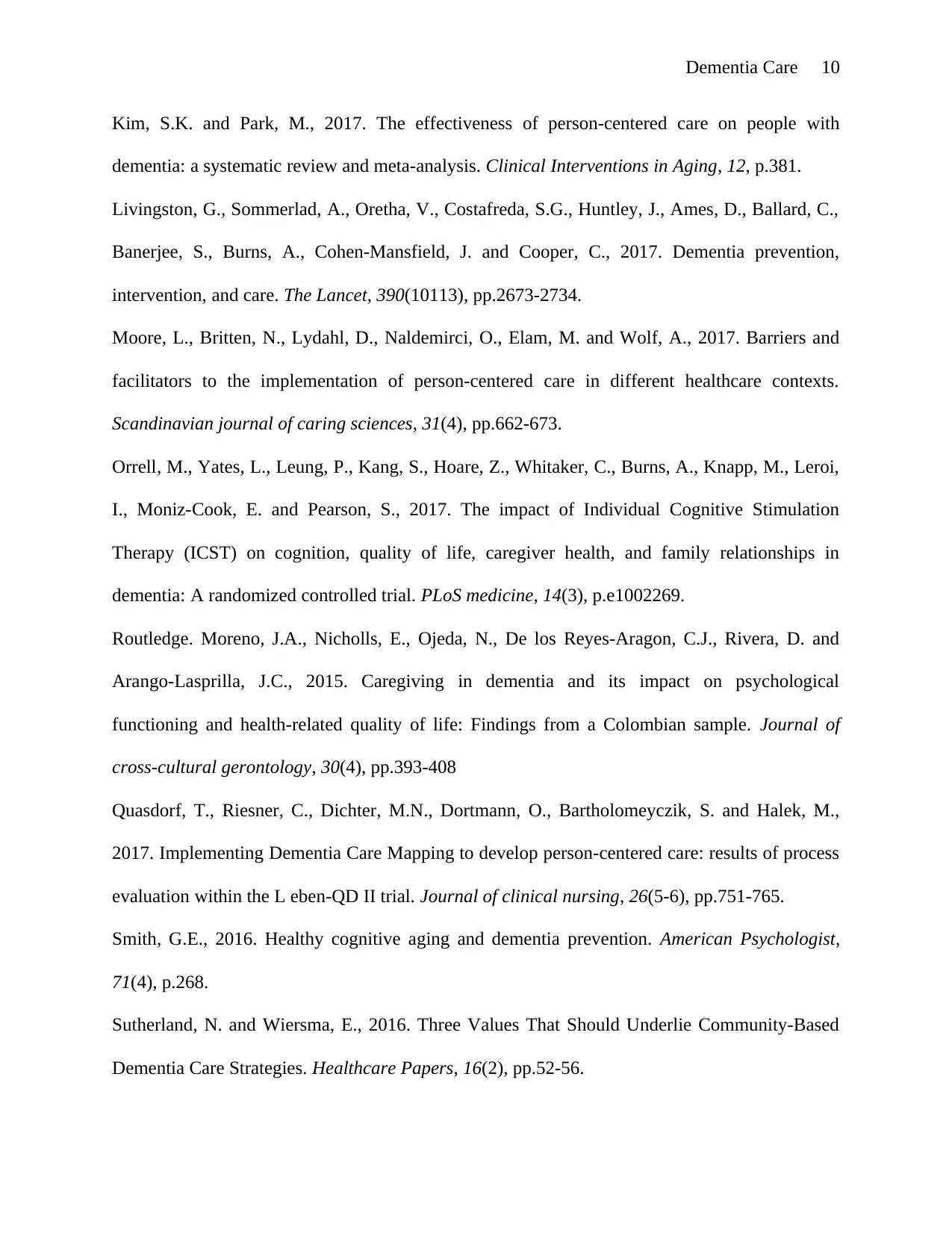
Dementia Care 10
Kim, S.K. and Park, M., 2017. The effectiveness of person-centered care on people with
dementia: a systematic review and meta-analysis. Clinical Interventions in Aging, 12, p.381.
Livingston, G., Sommerlad, A., Oretha, V., Costafreda, S.G., Huntley, J., Ames, D., Ballard, C.,
Banerjee, S., Burns, A., Cohen-Mansfield, J. and Cooper, C., 2017. Dementia prevention,
intervention, and care. The Lancet, 390(10113), pp.2673-2734.
Moore, L., Britten, N., Lydahl, D., Naldemirci, O., Elam, M. and Wolf, A., 2017. Barriers and
facilitators to the implementation of person-centered care in different healthcare contexts.
Scandinavian journal of caring sciences, 31(4), pp.662-673.
Orrell, M., Yates, L., Leung, P., Kang, S., Hoare, Z., Whitaker, C., Burns, A., Knapp, M., Leroi,
I., Moniz-Cook, E. and Pearson, S., 2017. The impact of Individual Cognitive Stimulation
Therapy (ICST) on cognition, quality of life, caregiver health, and family relationships in
dementia: A randomized controlled trial. PLoS medicine, 14(3), p.e1002269.
Routledge. Moreno, J.A., Nicholls, E., Ojeda, N., De los Reyes-Aragon, C.J., Rivera, D. and
Arango-Lasprilla, J.C., 2015. Caregiving in dementia and its impact on psychological
functioning and health-related quality of life: Findings from a Colombian sample. Journal of
cross-cultural gerontology, 30(4), pp.393-408
Quasdorf, T., Riesner, C., Dichter, M.N., Dortmann, O., Bartholomeyczik, S. and Halek, M.,
2017. Implementing Dementia Care Mapping to develop person-centered care: results of process
evaluation within the L eben‐QD II trial. Journal of clinical nursing, 26(5-6), pp.751-765.
Smith, G.E., 2016. Healthy cognitive aging and dementia prevention. American Psychologist,
71(4), p.268.
Sutherland, N. and Wiersma, E., 2016. Three Values That Should Underlie Community-Based
Dementia Care Strategies. Healthcare Papers, 16(2), pp.52-56.
Kim, S.K. and Park, M., 2017. The effectiveness of person-centered care on people with
dementia: a systematic review and meta-analysis. Clinical Interventions in Aging, 12, p.381.
Livingston, G., Sommerlad, A., Oretha, V., Costafreda, S.G., Huntley, J., Ames, D., Ballard, C.,
Banerjee, S., Burns, A., Cohen-Mansfield, J. and Cooper, C., 2017. Dementia prevention,
intervention, and care. The Lancet, 390(10113), pp.2673-2734.
Moore, L., Britten, N., Lydahl, D., Naldemirci, O., Elam, M. and Wolf, A., 2017. Barriers and
facilitators to the implementation of person-centered care in different healthcare contexts.
Scandinavian journal of caring sciences, 31(4), pp.662-673.
Orrell, M., Yates, L., Leung, P., Kang, S., Hoare, Z., Whitaker, C., Burns, A., Knapp, M., Leroi,
I., Moniz-Cook, E. and Pearson, S., 2017. The impact of Individual Cognitive Stimulation
Therapy (ICST) on cognition, quality of life, caregiver health, and family relationships in
dementia: A randomized controlled trial. PLoS medicine, 14(3), p.e1002269.
Routledge. Moreno, J.A., Nicholls, E., Ojeda, N., De los Reyes-Aragon, C.J., Rivera, D. and
Arango-Lasprilla, J.C., 2015. Caregiving in dementia and its impact on psychological
functioning and health-related quality of life: Findings from a Colombian sample. Journal of
cross-cultural gerontology, 30(4), pp.393-408
Quasdorf, T., Riesner, C., Dichter, M.N., Dortmann, O., Bartholomeyczik, S. and Halek, M.,
2017. Implementing Dementia Care Mapping to develop person-centered care: results of process
evaluation within the L eben‐QD II trial. Journal of clinical nursing, 26(5-6), pp.751-765.
Smith, G.E., 2016. Healthy cognitive aging and dementia prevention. American Psychologist,
71(4), p.268.
Sutherland, N. and Wiersma, E., 2016. Three Values That Should Underlie Community-Based
Dementia Care Strategies. Healthcare Papers, 16(2), pp.52-56.
Paraphrase This Document
Need a fresh take? Get an instant paraphrase of this document with our AI Paraphraser

Dementia Care 11
Zwan, M.D., Bouwman, F.H., Konijnenberg, E., Van Der Flier, W.M., Lammertsma, A.A.,
Verhey, F.R., Aalten, P., Van Berckel, B.N. and Scheltens, P., 2017. Diagnostic impact of
flutemetamol PET in early-onset dementia. Alzheimer's research & therapy, 9(1), p.2.
Zwan, M.D., Bouwman, F.H., Konijnenberg, E., Van Der Flier, W.M., Lammertsma, A.A.,
Verhey, F.R., Aalten, P., Van Berckel, B.N. and Scheltens, P., 2017. Diagnostic impact of
flutemetamol PET in early-onset dementia. Alzheimer's research & therapy, 9(1), p.2.
1 out of 11
Related Documents
Your All-in-One AI-Powered Toolkit for Academic Success.
+13062052269
info@desklib.com
Available 24*7 on WhatsApp / Email
![[object Object]](/_next/static/media/star-bottom.7253800d.svg)
Unlock your academic potential
Copyright © 2020–2026 A2Z Services. All Rights Reserved. Developed and managed by ZUCOL.





